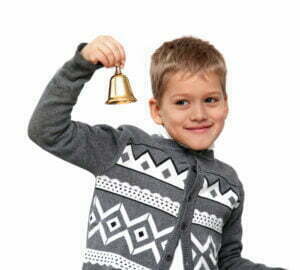We know from our research that the KITS Program helps children build better literacy and self-regulation skills before they go to kindergarten. An exciting new study that was just published also shows that KITS may help children’s brains process information more efficiently! Children who had been through the KITS Program showed a greater brain response to information that they had made a mistake. This is a really valuable skill in school because it could help children be better able to recognize and learn from their mistakes, so they can improve their performance over time.
The Study
As part of our study on how KITS helped children receiving early childhood special education who were entering kindergarten, we asked children to complete a Flanker Task. Children saw two different kinds of pictures. In one kind of picture all the dots were the same color—the congruent condition. In the other kind of picture, the center dot was a different color than the other dots-the incongruent condition. Children were asked to push the button on a button box that matched the color of the dot in the center of the row.

When children pushed the correct button, they saw a picture of a smiley face. When they made a mistake and pressed the wrong button, they saw a sad face.

While children were doing this task, we measured the electrical activity in their brains using an electroencephalograph. This means that we put electrodes on the children’s scalps that could pick up the activity going on inside their heads. This does not hurt the children at all and it is a really good way to be able to match brain activity to an event (like pushing a button or seeing the smiley/sad faces).

When we are looking at someone’s brain waves while they are doing a task, we can measure something called the FRN. This is a point where someone receives feedback about whether they made a mistake or did something correctly and the brain wave dips (see the picture below). Usually, people have a more negative FRN (meaning that it takes a deeper dip) in response to information that they have made a mistake. This means that they are paying more attention to their mistakes. Information about our mistakes can be more valuable than information about doing things correctly. If we do something correctly, we can just keep on going. If we made a mistake, we should pay more attention in order to figure out how to make a correct response the next time. This is the most efficient way to process feedback. In school, we want children to be able to recognize their mistakes so that they can learn from them.
This diagram shows the difference between an FRN in response to feedback that someone made a correct answer and an FRN in response to feedback that they made a mistake.

When we looked at children’s FRNs before they started the KITS Program, the FRNs were not really different whether the child made a mistake or a correct answer. This could mean that they did not really recognize of the feedback. After they had been in the KITS program, the children had a more negative FRN to feedback that they had a made a mistake. This suggests that they had learned to differentiate when they made a correct answer from when they did not and their brain was having a bigger response to the mistakes. For children who did not participate in the KITS Program at all, there were no changes in their brain activity over time. So this is a pretty good indicator that the changes we saw in the children receiving the KITS Program were due to KITS.

What does this mean?
If children get better at being able to recognize feedback that they have made a mistake, they may be better able to learn from and correct their mistakes in the future. This is what learning is all about. And this is what we want children to be able to do in school. So this study suggests that the KITS program helps children be better able to recognize and process feedback about mistakes at the level of their brains. This may mean that the changes are more permanent and might be more helpful in the long run. We are going to keep studying these changes to see if they can predict if children do better in school over time.
If you would like to read the abstract of the published study, please click here. And below is the full citation for the article:
Jennifer Martin McDermott, Katherine C. Pears, Jacqueline Bruce, Hyoun K. Kim, Leslie Roos, Karen L. Yoerger & Philip A. Fisher (2017): Improving kindergarten readiness in children with developmental disabilities: Changes in neural correlates of response monitoring, Applied Neuropsychology: Child, DOI: 10.1080/21622965.2017.1286239
[divider type=”standard” text=”Go to top” full_width=”no” width=”1/1″ el_position=”first last”]
Image: © Arkela | Dreamstime.com
[divider type=”standard” text=”Go to top” full_width=”no” width=”1/1″ el_position=”first last”]





